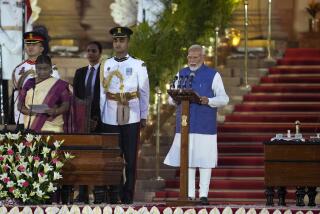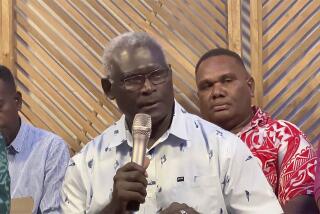Losing Vote of Confidence, India Premier Resigns; New Elections Expected
- Share via
NEW DELHI — Opening the door for possible new elections in India’s increasingly fragmented democracy, Parliament on Friday roundly rejected Prime Minister H.D. Deve Gowda, a peasant farmer who served only 10 months at the head of a fragile coalition government.
India’s long-ruling Congress (I) Party withdrew its support from the center-left government, and Gowda lost a vote of confidence by a lopsided margin before India’s lower house of Parliament, the Lok Sabha. He presented his resignation to President Shankar Dayal Sharma early this morning.
The final vote on the confidence motion was 158 in favor, 292 opposed and six abstentions.
“The president has accepted my resignation and asked me to continue as caretaker prime minister until alternative arrangements are made,” Gowda told reporters.
Caught in a political cross-fire between the ascendant Bharatiya Janata Party, which operates from a power base in predominantly Hindu northern India, and a much-weakened Congress Party that has ruled India for most of the 50 years since independence, Gowda, 63, urged new elections in a bitter closing speech that followed a long day of debate. “Go to the people with all courage and conviction,” Gowda told the legislators.
The BJP favors new elections, which several public opinion polls show they would win. But Congress, fearing continuing erosion of its position in Indian politics, is expected to seek another United Front coalition government with leftist and regional parties. Among the candidates mentioned to replace Gowda are Foreign Minister Inder Kumar Gujral, former Congress Party member G.K. Moopanar, who heads a breakaway party in Tamil Nadu, and Andhra Pradesh Chief Minister Chandrababu Naidu.
*
However, there is widespread bitterness against the Congress Party among the other members of the 13-party coalition that may work against the selection of a new leader. “I don’t see any other alternative but elections,” said Farooq Abdullah, a United Front leader from Jammu and Kashmir state.
In the 1996 parliamentary vote, Congress managed to win only 140 of the 542 seats in the Lok Sabha. Since then, India was ruled briefly by BJP leader Atal Behari Vajpayee, who lasted only 13 days as prime minister, and by Gowda, a compromise candidate who said he came to power reluctantly.
The Congress Party’s main complaint against Gowda was that he failed to block gains by the BJP in the populous states of Uttar Pradesh and Bihar. The rise of Hindu nationalism in India’s north is one of the few issues that forged the unlikely alliance of Communist, regional and rural-based parties that formed the ruling coalition.
In a move to ensure stability while it searches for new leadership or sets the stage for new elections, the Parliament on Friday also agreed to reconvene April 21 to consider the approval of a new budget that has many features favored by foreign investors, including across-the-board reductions on tariffs for imported goods.
The Friday debate demonstrated the increasingly pluralistic nature of Indian politics as dozens of small and great party leaders rose to speak. It concluded with a final emotional statement from Gowda, who looked defiant but weary.
“I am satisfied that in these months I have not betrayed my people,” Gowda said. “I have not betrayed my nation.”
More to Read
Sign up for Essential California
The most important California stories and recommendations in your inbox every morning.
You may occasionally receive promotional content from the Los Angeles Times.













